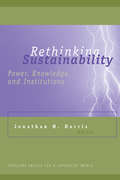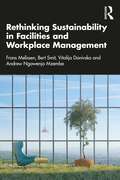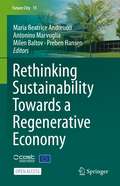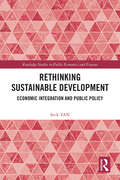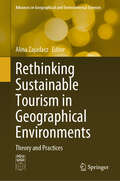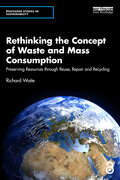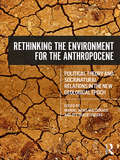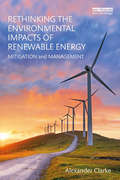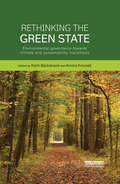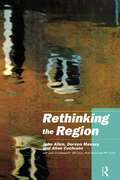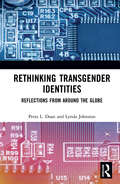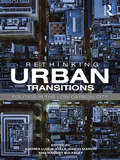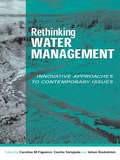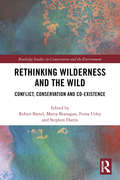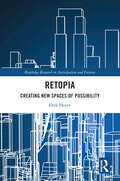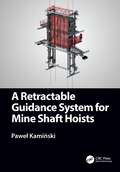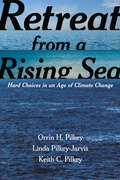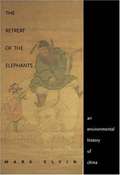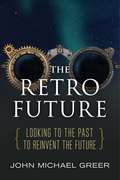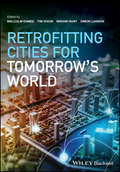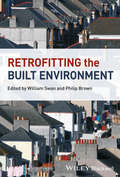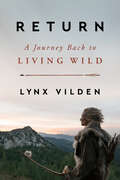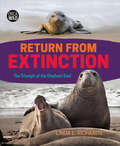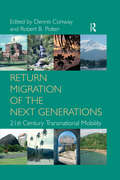- Table View
- List View
Rethinking Sustainability: Power, Knowledge, and Institutions
by Jonathan M. HarrisBringing together the thoughts of economists, political scientists, anthropologists, philosophers, and agricultural policy professionals, this volume focuses on the issues of sustainability in development. Examining such topics as international trade, political power, gender roles, legal institutions, and agricultural research, the contributors focus on the missing links in theory and practice that have been barriers to the achievement of truly sustainable development. Any theory of sustainable development must take into account economic, social, and environmental dimensions. Until recently, the question "What is development?" was often answered predominantly from the economist's perspective, with high priority being assigned to expansion of economic output. Social, political, institutional, and ethical aspects have often been neglected. But now that sustainable development has become a broadly accepted concept, it is impossible to maintain a narrowly economistic view of development. For this reason, the varied perspectives offered by the contributors to this volume are crucial to understanding the process of development as it relates to environmental sustainability and human well-being. The selection of articles is meant to be stimulating and provocative rather than comp-rehensive. They are roughly divided between those dealing with broad theoretical issues concerning the economic, political, and social aspects of development (Part I) and those presenting more applied analysis (Part II). The common thread is a concern for examining which factors contribute to making development socially just and environmentally sound. Rethinking Sustainability will be of interest to economists and social scientists, development professionals, and instructors seeking to offer their students a broad perspective on development issues.
Rethinking Sustainability in Facilities and Workplace Management
by Frans Melissen Bert Smit Vitalija Danivska Andrew Ngawenja MzembeThis book discusses sustainability within the facility management industry. However, it is not another anthology of so-called best practices and the seemingly endless range of certification schemes. It is also not a (marketing) guide on how to communicate high-pitched sustainability ambitions to potential customers to increase (short-term) market share. Instead, this book is based on the realisation that most facility management businesses and departments actually find it hard to truly integrate sustainability into their strategies, tactics and day-to-day operations in a coherent way. It is also based on the reference point that sustainable development cannot be realised only through technological advancements and new procedures; it requires new behavioural patterns of people. Not only of your own employees, as a supplier or department, but also of those for whom you design, stage and manage optimal workplace experiences. Those patterns will not emerge from nowhere but need to be purposely created and cultivated, based on a thorough understanding of what people and organisations need, want and desire. Through reviewing specific barriers and opportunities related to practical situations and examples at all three levels of facility management – the operational, tactical and strategic level – and supported by the latest theoretical insights, this book provides students and practitioners with inspiration and suggestions for using sustainability as a guideline for improving workplace experience concepts and FM strategies, services and processes. Each chapter uses specific cases and examples as the starting point for reflecting on avenues to move from treating sustainability as an add-on to using it as a powerful concept to create optimal workplace experiences. In doing so, these reflections provide lecturers, students and current and future professionals with practical guidelines and pointers to take sustainability within the facility management industry to a much-needed next level.
Rethinking Sustainability Towards a Regenerative Economy (Future City #15)
by Maria Beatrice Andreucci Antonino Marvuglia Milen Baltov Preben HansenThis open access book is based on work from the COST Action “RESTORE - REthinking Sustainability TOwards a Regenerative Economy'', and highlights how sustainability in buildings, facilities and urban governance is crucial for a future that is socially just, ecologically restorative, and economically viable, for Europe and the whole planet. In light of the search for fair solutions to the climate crisis, the authors outline the urgency for the built environment sector to implement adaptation and mitigation strategies, as well as a just transition. As shown in the chapters, this can be done by applying a broader framework that enriches places, people, ecology, culture, and climate, at the core of the design task - with a particular emphasis on the benefits towards health and resilient business practices.This book is one step on the way to a paradigm shift towards restorative sustainability for new and existing buildings. The authors want to promote forward thinking and multidisciplinary knowledge, leading to solutions that celebrate the richness of design creativity. In this vision, cities of the future will enhance users’ experience, health and wellbeing inside and outside of buildings, while reconciling anthropic ecosystems and nature. A valuable resource for scientists and students in environmental sciences and architecture, as well as policy makers, practitioners and investors in urban and regional development.
Rethinking Sustainable Development: Economic Integration and Public Policy (Routledge Studies in Public Economics and Finance)
by Seck TANThis book demonstrates falsified economic performance of global economies when the environment is not recognised as a capital, and when the ecosystem is overlooked towards sustainable development.Seck begins with an analysis of standard macroeconomic framework and policy practice. He argues, with reference to environmental accounting literature, that environmental capital must form an integral component of economic measurement. This paves the way for an alternative environmental-macroeconomics framework for policy analysis that promotes sustainable development. The book demonstrates how environmental capital can be measured with reference to select OECD countries and provides a methodology for analysing how macroeconomic goals are related to a steady-state economy. Seck then concludes with a summary of the conflict between current economic growth and ecosystem preservation, and outlines possible policy improvements and directions for research.Rethinking Sustainable Development is an invaluable reference for policymakers as well as researchers and students of environmental economics, sustainable development, and macroeconomics.
Rethinking Sustainable Tourism in Geographical Environments: Theory and Practices (Advances in Geographical and Environmental Sciences)
by Alina ZajadaczThis book covers the current escalation of social problems related to the unstable political situation, economic crisis, as well as growing problems related to the state of the natural environment (existential climate crisis; pollution of land, oceans, and the atmosphere; severe declines in biodiversity) which requires a new rethinking of the sustainable tourism paradigm, in relation to the realities of the modern world, based on the practices observed in the tourist services sector. „Tourism is like fire, you can cook food on it, you can also burn down your house”—says the proverb. On the one hand, it allows for the regeneration of physical and mental strength of visitors, as well as provides funds for the economic development of the destination, but on the other hand, it contributes to a lot of damage to the geographical environment. The period of "stopping" of tourism during the lockdown caused by the COVID-19 pandemic allowed many areas to be relieved of the tourist traffic, which resulted in the observed revitalization of the natural environment, but also huge social and economic problems in destinations that are largely dependent on income from tourism. The rapid resurgence of tourism after the pandemic restored revenues but also caused many social tensions. The problem of overtourism returned, and residents protested, calling for "tourists to go home." The entire tourism system requires a thorough analysis of the complex consequences of its development. This book presents many challenges facing contemporary tourism. Its theoretical and practical aspects provide a useful knowledge base for both researchers studying changes in tourism and practitioners in the tourism services sector. The content also serves as an inspiration to search for optimal solutions aimed at the sustainable development of contemporary and future tourism.
Rethinking the Concept of Waste and Mass Consumption: Preserving Resources through Reuse, Repair and Recycling (Routledge Studies in Sustainability)
by Richard WaiteThis book presents hard facts, drawn from extensive research, to highlight our unsustainable consumption of the Earth’s resources and the limitations of the UK’s current management of waste and recycling.Setting out a bleak picture of a world in which we are literally consuming our planet, the book explores the psychological, economic and capitalist drivers behind this behaviour. Controversially, the book examines the drawbacks of the current approach adopted by many local authorities on the kerbside collection of recyclable materials, as well as the UK governments’ strategic approaches to household recycling, including the lack of UK- wide infrastructures for packaging reuse, and for product repair and recycling. It challenges the whole concept of waste, leading to a proposed new strategy for the management of household waste, including a simplified household collection system, the introduction of an incineration tax and the banning of all household waste exports. The author proposes reconceptualising waste as unwanted but valuable material and argues that the responsibility for facilitating reuse, repair and recycling, rests with manufacturers who must start designing with the end in mind.Given the current economic climate, and a dampening of the green agenda within UK politics, the book provides a much- needed call for critical discourse on how, and how much, we consume and sets out clear, practical solutions for change. The book will be of interest to manufacturers, retailers, consumers, local authorities, policy makers, students and professionals looking to reduce our impact on the environment.
Rethinking the Environment for the Anthropocene: Political Theory and Socionatural Relations in the New Geological Epoch
by Manuel Arias-Maldonado Zev TrachtenbergThis book brings together the most current thinking about the Anthropocene in the field of Environmental Political Theory ('EPT'). It displays the distinctive contribution EPT makes to the task of thinking through what 'the environment' means in this time of pervasive human influence over natural systems. Across its chapters the book helps develop the idea of 'socionatural relations'—an idea that frames the environment in the Anthropocene in terms of the interconnected relationship between human beings and their surroundings. Coming from both well-established and newer voices in the field, the chapters in the book show the diversity of points of view theorists take toward the Anthropocene idea, and socionatural relations more generally. However, all the chapters exemplify a characteristic of work in EPT: the self-conscious effort to provide normative interpretations that are responsive to scientific accounts. The Introduction explains the complicated interaction between science and EPT, showing how it positions EPT to consider the Anthropocene. And the Afterword, by a pioneer in the field, relates all the chapters to a perspective that has been deeply influential in EPT. This book will be of interest to scholars already engaged in EPT. But it will also serve as an introduction to the field for students of Political Theory, Philosophy, Environmental Studies, and related disciplines, who will learn about the EPT approach from the Introduction, and then see it applied to the pressing question of the Anthropocene in the ensuing chapters. The book will also help readers interested in the Anthropocene from any disciplinary perspective develop a critical understanding of its political meanings.
Rethinking the Environmental Impacts of Renewable Energy: Mitigation and management
by Alexander ClarkeRenewable energy is important as a substitute for finite fossil fuels and inflexible nuclear power and could conceivably power the world. However, this is challenging as the world is currently 80% dependent on fossil fuels, and renewable sources produce only about 15% of total energy. Conversion technologies for use with many of the eight different primary sources of renewable energy are only just emerging as viable technologies. While renewable energy sources will not run out, and their use involves little or no release of carbon dioxide or ionising wastes, they do have local environmental impacts of their own. This book analyses the nature of environmental impacts from renewable sources. A novel method of assessing impacts is explored based on a set of parameters centred on how diffuse or concentrated the energy flow is. The approach that is developed will inform engineers, designers, policy makers and planners as well as researchers in the area.
Rethinking the Green State: Environmental governance towards climate and sustainability transitions (Routledge Studies in Sustainability)
by Karin Bäckstrand Annica KronsellThis innovative book is one of the first to conduct a systematic comprehensive analysis of the ideals and practices of the evolving green state. It draws on elements of political theory, feminist theory, post-structuralism, governance and institutional theory to conceptualise the green state and advances thinking on how to understand its emergence in the context of climate and sustainability transitions. Focusing on the state as an actor in environmental, climate and sustainability politics, the book explores different principles guiding the emergence of the green state and examines the performance of states and institutional responses to the sustainable and climate transitions in the European and Nordic context in particular. The book’s unique focus on the Nordic countries underlines the important to learn from Nordics, which are perceived to be in the forefront of climate and sustainability governance as well as historically strong welfare states. With chapter contributions from leading international scholars in political science, sociology, economics, energy and environmental systems and climate policy studies, this book will be of great value to postgraduate students and researchers working on sustainability transitions, environmental politics and governance, and those with an area studies focus on the Nordic countries.
Rethinking the Region: Spaces of Neo-Liberalism
by John Allen with Julie Charlesworth Allan Cochrane Gill Court Nick Henry Doreen Massey Phil SarreRethinking the Region argues that regions are not simply bounded spaces on a map. This book uses unique research of England during the 1980s to show how regions are made and unmade by social processes. The book examines how new lines of division both social and geographical were laid down as free-market growth and reconstructed this are as a `neo-liberal' region. The authors argue that a more balanced form of growth is possible - within and between regions as well as between social groups. This book shows that to grasp the complexities of growth we must rethink `the region' in time as well as in space.
Rethinking Transgender Identities: Reflections from Around the Globe
by Petra L. Doan Lynda JohnstonThis volume explores the diversity and complexity of transgender people’s experiences and demonstrates that gendered bodies are constructed through different social, cultural and economic networks and through different spaces and places. Rethinking Transgender Identities brings together original research in the form of interviews, participatory methods, surveys, cultural texts and insightful commentary. The contributing scholars and activists are located in Aotearoa New Zealand, Brazil, Canada, Catalan, China, Japan, Scotland, Spain, and the United States. The collection explores the relationship between transgender identities and politics, lived realities, strategies, mobilizations, age, ethnicity, activisms and communities across different spatial scales and times. Taken together, the chapters extend current research and provide an uthoritative state-of-the-art review of current research, which will appeal to cholars and graduate students working within the fields of sociology, gender studies, sexuality and queer studies, family studies, media and cultural studies, psychology, health, law, criminology, politics and human geography.
Rethinking Urban Transitions: Politics in the Low Carbon City
by Andrés Luque-Ayala Simon Marvin Harriet BulkeleyRethinking Urban Transitions provides critical insight for societal and policy debates about the potential and limits of low carbon urbanism. It draws on over a decade of international research, undertaken by scholars across multiple disciplines concerned with analysing and shaping urban sustainability transitions. It seeks to open up the possibility of a new generation of urban low carbon transition research, which foregrounds the importance of political, geographical and developmental context in shaping the possibilities for a low carbon urban future. The book’s contributions propose an interpretation of urban low carbon transitions as primarily social, political and developmental processes. Rather than being primarily technical efforts aimed at measuring and mitigating greenhouse gases, the low carbon transition requires a shift in the mode and politics of urban development. The book argues that moving towards this model requires rethinking what it means to design, practise and mobilize low carbon in the city, while also acknowledging the presence of multiple and contested developmental pathways. Key to this shift is thinking about transitions, not solely as technical, infrastructural or systemic shifts, but also as a way of thinking about collective futures, societal development and governing modes – a recognition of the political and contested nature of low carbon urbanism. The various contributions provide novel conceptual frameworks as well as empirically rich cases through which we can begin to interrogate the relevance of socio-economic, political and developmental dimensions in the making or unmaking of low carbon in the city. The book draws on a diverse range of examples (including ‘world cities’ and ‘ordinary cities’) from North America, South America, Europe, Australia, Africa, India and China, to provide evidence that expectations, aspirations and plans to undertake purposive socio-technical transitions are both emerging and encountering resistance in different urban contexts. Rethinking Urban Transitions is an essential text for courses concerned with cities, climate change and environmental issues in sociology, politics, urban studies, planning, environmental studies, geography and the built environment.
Rethinking Water Management: Innovative Approaches to Contemporary Issues
by Johan Rockström Cecilia Tortajada Caroline M FiguèresIf water resources are to be distributed efficiently, equitably and cost-effectively in this rapidly changing world, then it is clear that current water management practices are no longer feasible. Innovative approaches are required to meet the increasing water demands of a growing world population and economy and the needs of the ecosystems supporting them. New approaches have to be employed at global, national and local levels. In Rethinking Water Management, a new generation of water experts from around the world examine the critical challenges confronting the water profession, including rainwater and groundwater management, recycling and reuse, water rights, transboundary access to water and financing of water. They offer important new perspectives on the use, management and conservation of fresh water, in terms of both quantity and quality, for the domestic, agricultural and industrial sectors, and show how a new set of paradigms can be applied to successfully manage water for the future. Caroline Figueres is Head of the Urban Infrastructure Department at UNESCO-IHE Water Education Institute in The Netherlands. Cecilia Tortajada is Vice President of the Third World Centre for Water Management in Mexico and Vice President-elect of the International Water Resources Association. Johan Rockström is Water Resources Expert at UNESCO-IHE.
Rethinking Wilderness and the Wild: Conflict, Conservation and Co-existence (Routledge Studies in Conservation and the Environment)
by Robyn Bartel Marty Branagan Fiona Utley Stephen HarrisRethinking Wilderness and the Wild: Conflict, Conservation and Co-existence examines the complexities surrounding the concept of wilderness. Contemporary wilderness scholarship has tended to fall into two categories: the so-called ‘fortress conservation’ and ‘co-existence’ schools of thought. This book, contending that this polarisation has led to a silencing and concealment of alternative perspectives and lines of enquiry, extends beyond these confines and in particular steers away from the dilemmas of paradise or paradox in order to advance an intellectual and policy agenda of plurality and diversity rather than of prescription and definition. Drawing on case studies from Australia, Aoteoroa/New Zealand, the United States and Iceland, and explorations of embodied experience, creative practice, philosophy, and First Nations land management approaches, the assembled chapters examine wilderness ideals, conflicts and human-nature dualities afresh, and examine co-existence and conservation in the Anthropocene in diverse ontological and multidisciplinary ways. By demonstrating a strong commitment to respecting the knowledge and perspectives of Indigenous peoples, this work delivers a more nuanced, ethical and decolonising approach to issues arising from relationships with wilderness. Such a collection is immediately appropriate given the political challenges and social complexities of our time, and the mounting threats to life across the globe. The abiding and uniting logic of the book is to offer a unique and innovative contribution to engender transformations of wilderness scholarship, activism and conservation policy. This text refutes the inherent privileging and exclusionary tactics of dominant modes of enquiry that too often serve to silence non-human and contrary positions. It reveals a multi-faceted and contingent wilderness alive with agency, diversity and possibility. This book will be of great interest to students and scholars of conservation, environmental and natural resource management, Indigenous studies and environmental policy and planning. It will also be of interest to practitioners, policymakers and NGOs involved in conservation, protected environments and environmental governance.
Retopia: Creating New Spaces of Possibility (Routledge Research in Anticipation and Futures)
by Dirk HoyerRetopia tells the story of social innovation in times of crisis, and through its cross-disciplinary narrative it goes beyond existing forms of future anticipation and maps out a practice-based approach to the creation of new realities. It explores how new imaginaries, social experiments, and laboratories of societies can create spaces of possibilities, revalidate the peripheries, and create new forms of social coherence. The peripheral regions in Europe are facing a crisis triangle: depopulation, the rise of the ‘useless’ class, and outdated social welfare systems. It is a crisis of political imaginaries and a lack of inspiring political stories. In response to this, the book specifically focuses on the concept of ‘retopia’, the idea of creating inclusive spaces of social innovation that encourage active participation. Through the creation of relocalized societies with a high degree of autonomy in ‘leftover’ spaces, such as Sicily, Western Latvia, or Northern Bulgaria, retopian redevelopment schemes offer new perspectives on ‘ruined spaces’. Retopia uncovers the common links and limitations of utopian studies, future studies, degrowth, narratology, the commons, and political geography. Retopia: Creating New Spaces of Possibility is an articulation of the potentialities of social innovation, political imaginaries, and future images, provoking a stimulating discussion among scholars and students in the fields of Politics and Future and Anticipation Studies.
A Retractable Guidance System for Mine Shaft Hoists
by Paweł KamińskiRope guidance of conveyances is commonly used in shafts of underground mines in numerous countries on almost every continent. This safe and economical way of guiding skips and cages does have one disadvantage, however, which is especially troublesome in the conditions present in the Polish mining industry. Rope-guided conveyances require additional support at mine levels, while shafts of Polish coal mines usually operate on many levels. Additional stiff guidance at mine levels used as a support negatively affects the effectiveness of rope-guided hoisting systems. The retractable guidance system was originally introduced at the 960 m level in the Leon IV shaft of the Rydułtowy coal mine in Rydułtowy (currently ROW mine, Rydułtowy department), Silesian voivodeship, Poland. This construction, consisting of moveable elements, similar to the typical stiff guidance used at mine levels, serves as a support for the conveyance whenever necessary. When it is retracted, it allows the cage to travel at full speed through the level, increasing the degree of effectiveness of the hoisting system of the Leon IV shaft. The retractable guidance system, the solution presented in this book, is a pioneering approach in the Polish mining industry. It has allowed improvement of the level of effectiveness of the Leon IV shaft of the Rydułtowy colliery. It is an innovative opportunity for rope guidance systems worldwide, as it solves their biggest problem in multi-level shafts.
Retreat from a Rising Sea: Hard Choices in an Age of Climate Change
by Orrin H. Pilkey Linda Pilkey-Jarvis Keith C. PilkeyMelting ice sheets and warming oceans are causing the seas to rise. By the end of this century, hundreds of millions of people living at low elevations along coasts will be forced to retreat to higher and safer ground. Because of sea-level rise, major storms will inundate areas farther inland and will lay waste to critical infrastructure, such as water-treatment and energy facilities, creating vast, irreversible pollution by decimating landfills and toxic-waste sites. This big-picture, policy-oriented book explains in gripping terms what rising oceans will do to coastal cities and the drastic actions we must take now to remove vulnerable populations.The authors detail specific threats faced by Miami, New Orleans, New York, and Amsterdam. Aware of the overwhelming social, political, and economic challenges that would accompany effective action, they consider the burden to the taxpayer and the logistics of moving landmarks and infrastructure, including toxic-waste sites. They also show readers the alternative: thousands of environmental refugees, with no legitimate means to regain what they have lost. The authors conclude with effective approaches for addressing climate-change denialism and powerful arguments for reforming U.S. federal coastal management policies.
Retreat from a Rising Sea: Hard Choices in an Age of Climate Change
by Orrin H. Pilkey Linda Pilkey-Jarvis Keith C. PilkeyThis sobering examination of climate-change and the disastrous effects of rising sea levels explains what must be done to avoid the worst outcomes. By the end of this century, hundreds of millions of people living at low elevations along coasts will be forced to retreat to higher and safer ground. Because of sea-level rise, major storms will inundate areas farther inland and will lay waste to critical infrastructure, such as water-treatment and energy facilities, creating vast, irreversible pollution by decimating landfills and toxic-waste sites. Retreat from a Rising Sea explains in gripping terms what rising oceans will do to coastal cities—detailing the specific threats faced by Miami, New Orleans, New York, and Amsterdam. This policy-oriented book then lays out the drastic actions we must take now to remove vulnerable populations. Aware of the overwhelming social, political, and economic challenges that would accompany effective action, the authors consider the burden to the taxpayer and the logistics of moving landmarks and infrastructure, including toxic-waste sites. They also show readers the alternative: thousands of environmental refugees, with no legitimate means to regain what they have lost. The authors conclude with effective approaches for addressing climate-change denialism and powerful arguments for reforming U.S. federal coastal management policies.
The Retreat of the Elephants: An Environmental History of China
by Mark ElvinOpening a door into the Chinese past, this book provides both a new perspective on long-term Chinese history and an explanation of the roots of China's current environmental crisis.
The Retro Future: Looking to the Past to Reinvent the Future
by John Michael GreerThe author of The Long Descent examines a solution for the troubles of our modern age: technical regression.To most people paying attention to the collision between industrial society and the hard limits of a finite planet, it’s clear that things are going very, very wrong. We no longer have unlimited time and resources to deal with the crises that define our future, and the options are limited to the tools we have on hand right now.This book is about one very powerful option: deliberate technological regression.Technological regression isn’t about “going back”—it’s about using the past as a resource to meet the needs of the present. It starts from the recognition that older technologies generally use fewer resources and cost less than modern equivalents, and it embraces the heresy of technological choice—our ability to choose or refuse the technologies pushed by corporate interests.People are already ditching smartphones and going back to “dumb phones” and land lines and e-book sales are declining while printed books rebound. Clear signs among many that blind faith in progress is faltering and opening up the possibility that the best way forward may well involve going back.A must-read for anyone willing to think the unthinkable and embrace the possibilities of a retro future.Praise for The Retro Future“Whether or not you accept John Michael Greer’s argument that a deindustrialized future is inevitable, you’ll appreciate his call for the freedom to select the best technologies of the past—worthy and sustainable tools, not pernicious prosthetics. Greer’s vision of a “post-progress” world is clear, smart, and ultimately hopeful.” —Richard Polt, professor of philosophy, Xavier University; author, The Typewriter Revolution: A Typist’s Companion for the 21st Century“What might your life be like without an automobile, TV, or a mobile phone? Ask John Michael Greer, who lives that way and recommends it as practice for the soon-to-be-normal. Greer says we are embarked upon the post-progress era. Climate change, loose nukes, and resource exhaustion are among its many challenges. In The Retro Future, Greer looks backward to mark the way forward.” —Albert Bates, author, The Post-Petroleum Survival Guide, The Biochar Solution, and The Paris Agreement
Retrofitting Cities for Tomorrow's World
by Malcolm Eames Tim Dixon Miriam Hunt Simon LannonA groundbreaking exploration of the most promising new ideas for creating the sustainable cities of tomorrow The culmination of a four-year collaborative research project undertaken by leading UK universities, in partnership with city authorities, prominent architecture firms, and major international consultants, Retrofitting Cities for Tomorrow's World explores the theoretical and practical aspects of the transition towards sustainability in the built environment that will occur in the years ahead. The emphasis throughout is on emerging systems innovations and bold new ways of imagining and re-imagining urban retrofitting, set within the context of 'futures-based' thinking. The concept of urban retrofitting has gained prominence within both the research and policy arenas in recent years. While cities are often viewed as a source of environmental stress and resource depletion they are also hubs of learning and innovation offering enormous potential for scaling up technological responses. But city-level action will require a major shift in thinking and a scaling up of positive responses to climate change and the associated threats of environmental and social degradation. Clearly the time has come for a more coordinated, planned, and strategic approach that will allow cities to transition to a sustainable future. This book summarizes many of the best new ideas currently in play on how to achieve those goals. Reviews the most promising ideas for how to approach planning and coordinating a more sustainable urban future by 2050 through retrofitting existing structures Explores how cities need to govern for urban retrofit and how future urban transitions and pathways can be managed, modeled and navigated Offers inter-disciplinary insights from international contributors from both the academic and professional spheres Develops a rigorous conceptual framework for analyzing existing challenges and fostering innovative ways of addressing those challenges Retrofitting Cities for Tomorrow's World is must-reading for academic researchers, including postgraduates insustainability, urban planning, environmental studies, economics, among other fields. It is also an important source of fresh ideas and inspiration for town planners, developers, policy advisors, and consultants working within the field of sustainability, energy, and the urban environment.
Retrofitting the Built Environment
by William Swan Philip BrownThe physical upgrading of the existing domestic and industrial building stock to improve energy performance is an essential part of a transition to a low carbon society. Successfully retrofitting buildings to improve energy performance is not simply a technological challenge, it is a complex socio-technical problem that needs to be addressed in a co-ordinated way, utilising skills and knowledge from a range of industrial and academic backgrounds. Within both the academic and practitioner communities there is a growing understanding of the scale and nature of the problem, one which encompasses issues such as policy and regulation, people and behaviour, supply chain and process, as well as issues of technology. Retrofitting the Built Environment discusses the factors that impact on the retrofit problem, providing a clear analysis of the main issues that the academic and industrial communities must engage with to resolve the problems of domestic energy and retrofit. The book is divided into four broad sections: Understanding the Problem Policy and Regulation Implementing and Evaluating Retrofit People and Communities Academic and industrial researchers, policy makers and industry practitioners will find each section covers a mix of policy, technical and social science issues, presented by both academic and industry authors, giving a wide and detailed perspective of the issue. The Editors Will Swan is a Senior Lecturer in Buildings Retrofit in the School of the Built Environment at the University of Salford. He leads a number of projects in the field of sustainable retrofit, covering a number of topics including monitoring, behaviour and retrofit project delivery, as part of Salford’s Applied Energy and Buildings Research Group. He sits on the Greater Manchester Buildings Group and also is Chair of the Retrofit Innovation Group. Philip Brown is Director and Senior Research Fellow at the Salford Housing & Urban Studies Unit (SHUSU) at the University of Salford. He is the lead academic on end-use energy demand within the Applied Energy and Buildings Research Group, and sits on Greater Manchester’s Low Carbon Economic Area group for Customer Engagement.
Return: A Journey Back to Living Wild
by Lynx VildenIn this stunning memoir, beloved internationally acclaimed earth advocate chronicles her journey to reconnect with the earth, offering a model for how we all can nurture the wild around and inside ourselves.In 1991, twenty-four-year-old Lynx Vilden crawled out of a sweat lodge covered in mud, her face streaked with tears, and whispered a promise to the earth: “I will love you and cherish you, I will learn how to live and share what you teach me.” That promise became Vilden’s life purpose: to return to the ways of our oldest ancestors, to a simpler life, and to listen deeply to Earth and what she has to say. Over the next thirty years, Vilden’s mission would lead her far from the city streets and punk bands of London and Amsterdam where she was raised, on a long and winding journey spanning continents and seasons, and filled with indigenous wisdom, Stone Age hunting skills, and important lessons from nature.In this illuminating memoir, Vilden shares the joys that await all of us when we reconnect with the earth, when we recognize what has been lost, and understand what we gain by meaningfully returning to our roots and become rewilded. Return is a glimpse into her extraordinary world—from stories about mentoring Silicon Valley millennials at her Stone Age immersion in rural Washington State to adventures traveling among Sami reindeer herders in Arctic Sweden to detailing the intricacies of just how to pursue and survive a wild lifestyle inspired by Stone Age humans.This extraordinary debut ultimately invigorates our hunger to renew our bonds with the earth and awaken our wildest, most primal selves.
Return from Extinction: The Triumph of the Elephant Seal (Orca Wild #5)
by Linda L. RichardsLess than 100 years ago, the northern elephant seal was thought to be extinct. Today more than 250,000 elephant seals swim in the Pacific Ocean from Alaska to Mexico. In Return from Extinction: The Triumph of the Elephant Seal Linda L. Richards tells the story of their dramatic recovery. Elephant seals were hunted to near extinction for their precious oil before the Mexican government stepped in to protect them. Many people thought it was too late. Even though the life of the elephant seal is difficult and only 20 percent of pups born will make it to adulthood, the species adapted and came back from the brink. They are a true conservation success story.
Return Migration of the Next Generations: 21st Century Transnational Mobility
by Dennis ConwayThere is renewed interest in return migration among researchers of global movement patterns. Until recently, it was overlooked, regarded as the result of failure by emigrants, or related to the return of retired, elderly migrants. This important study looks at the one-and-a-half and second generation migrants, the youthful contract workers and the 'prolonged sojourners' and the consequences of their return to source communities.
